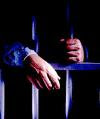The Associated Press
 CHICAGO | Rod Blagojevich, who rode his talkative everyman image to two terms as Illinois governor before scandal made him a national punch line, was convicted Monday of corruption charges, including the incendiary allegation that he tried to sell or trade President Barack Obama’s Senate seat.
CHICAGO | Rod Blagojevich, who rode his talkative everyman image to two terms as Illinois governor before scandal made him a national punch line, was convicted Monday of corruption charges, including the incendiary allegation that he tried to sell or trade President Barack Obama’s Senate seat.Blagojevich had spent 2 1/2 years professing his innocence on reality TV shows and later on the witness stand. He faces up to 300 years in prison, although federal sentencing guidelines are sure to significantly reduce his time behind bars.
The verdict appeared to be the conclusion, at last, to the spectacle of Blagojevich’s political career, which began its descent shortly after Obama was elected president in November 2008.
A month after Election Day, Blagojevich, who was required to name a senator to replace Obama, was arrested, and federal agents revealed that they had secretly recorded hundreds of hours of damaging phone calls by him and his advisers.
Blagojevich was accused of trying to secure campaign contributions, a cabinet post or a high-paying job in exchange for his official acts as governor. Blagojevich was acquitted on one charge of bribery, and the jury deadlocked on two counts of attempted extortion, but convictions came on the bulk of the counts and on those related to the Senate seat — the claims that had drawn international headlines.
After hearing the verdict, Blagojevich turned to defense attorney Sheldon Sorosky and asked, “What happened?”
The former governor spoke only briefly as he left the courthouse.
“Well, among the many lessons I’ve learned from this whole experience is to try to speak a little bit less, so I’m going to keep my remarks kind of short,” Blagojevich said.
Blagojevich becomes the second straight Illinois governor convicted of corruption. His predecessor, George Ryan, is serving 6 1/2 years in federal prison.
The case exploded into scandal when Blagojevich was awakened by federal agents on Dec. 9, 2008, at his Chicago home and was led away in handcuffs. “The conduct would make Lincoln roll over in his grave,” U.S. Attorney Patrick Fitzgerald said after the arrest.
Blagojevich, who was also accused of shaking down businessmen for campaign contributions, was swiftly impeached and removed from office. Fitzgerald pledged to retry the governor after the first jury deadlocked on all but the least serious charges.
This time, the 12 jurors voted to convict the 54-year-old Blagojevich on 17 of 20 counts after deliberating nine days. He also faces up to five additional years in prison for his previous conviction of lying to the FBI.
The jurors agreed with prosecutors that Blagojevich had tried to sell the Senate in a variety of ways, including an attempt to steer it to U.S. Rep. Jesse Jackson Jr. in exchange for $1.5 million in campaign cash promised by Jackson supporters.
After his arrest, Blagojevich called federal prosecutors “cowards and liars.”
In what many saw as embarrassing indignities for a former governor, he sent his wife to the jungle for a reality television show, “I’m a Celebrity, Get Me Out of Here,” where she had to eat a tarantula. He later showed his own ineptitude at simple office skills before being fired on Donald Trump’s “Celebrity Apprentice.”
In the second trial, attorneys for the former governor put on a defense — highlighted by a chatty Blagojevich taking the witness stand for seven days to portray himself as a big talker but not a criminal.
Blagojevich seemed to believe he could talk his way out of trouble from the witness stand. Indignant one minute, laughing the next, seemingly in tears once, he endeavored to counteract the blunt, greedy man he appeared to be on FBI wiretaps.
He told jurors his talk on the wiretaps merely displayed his approach to decision-making: to invite a whirlwind of ideas — “good ones, bad ones, stupid ones” — then toss the ill-conceived ones out. To demonstrate the absurdities such brainstorming could generate, he said he once considered appointing himself to the Senate seat so he could travel to Afghanistan and help hunt down Osama bin Laden.
Other times, when a prosecutor read transcripts where Blagojevich seems to speak clearly of trading the Senate seat for a job, Blagojevich told jurors, “I see what I say here, but that’s not what I meant.”
Among the tapes played for jurors was his infamous rant: “I’ve got this thing and it’s f---ing golden, and I’m just not giving it up for f---ing nothing. I’m not gonna do it.”
The New York Times and the Chicago Tribune contributed to this report.


